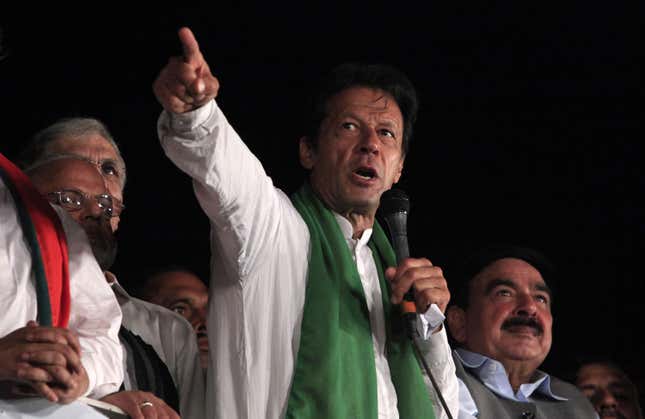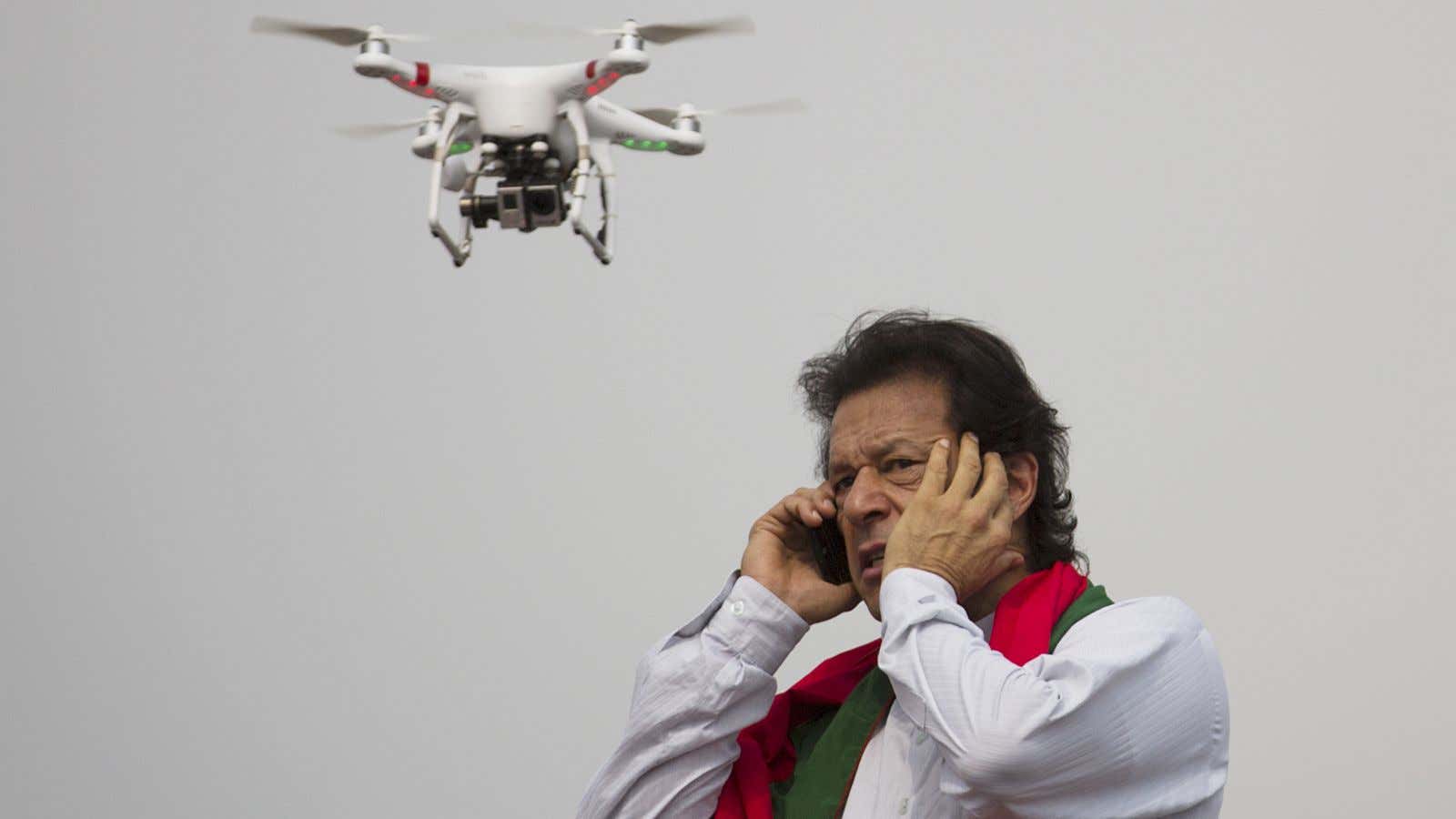As the death toll from the Peshawar school attack mounted, Pakistan Movement for Justice (PTI) chairman Imran Khan called off his anti-government protests. It was a quiet end to a movement that started with pomp and gusto.
The contrasting images of Khan hurling insults at prime minister Nawaz Sharif while shouting at festive crowds during the summer, and of him sitting quietly next to Sharif as they issued a joint call for unity after Dec. 16, highlight both the gravity of the attack—and how receptive Khan has been to it.
The protests had ebbed and flowed, threatening to topple the government and force re-election at one point, and becoming a laughing stock at another.
They prompted heated arguments about legitimacy, accountability and corruption. But they were also criticized, not least by the governing party itself, for dragging the national debate elsewhere, when efforts to solve Pakistan’s security, electricity, and economic crises were more important.
With all the talk of whether this attack, which killed 136 children, is the “tipping point” in Pakistan’s fight against militancy, many eyes turned to Khan who, so far, had seemed less concerned with militancy and more with the prime minister’s office he thinks he deserves.
Initially, this was not the case.
Estranged brothers
PTI was the torch-bearer against American drone strikes, and came up with the chicken-and-egg argument that all cases of terrorism are just a response to the drone strikes. If the drone strikes stop, so would the bombings. When they didn’t, he took to sabotaging and blocking NATO supply trucks on their way to Afghanistan.
He emerged as the biggest proponent of negotiations with the Taliban, referring to them as “our estranged brothers” but he excused himself from the negotiations when it was being put together.
Last year, a church was attacked by a suicide bomber in Peshawar, a region administered by PTI, and 86 people were killed. Khan’s response contained little sympathy for the victims, but a lot of anger for those attempting to “derail” the peace process. Given that the attack was claimed by Islamic militants, it seemed odd that those who were derailing the peace process were the ones he wanted to make peace with in the first place. There was even more criticism because of Khan’s unwillingness to name the derailers.
But all that rhetoric vanished after the military launched an operation against the Taliban in June this year. Khan realized that directly contradicting the most powerful institution in the country was not politically salient. So, he ignored militancy completely and began his anti-rigging protest.
He has an incredible tendency to take issues that perhaps do not get the attention they deserve, and talk about them for so long that people are forced to confront them.
Take, for example, last year’s elections.
Match-fixing
While most parties accepted the results, even the ones that lost, Khan did not. Well, sort of.
He did begrudgingly accept the results while calling them fraudulent, but decided to revisit that decision 14 months later. On Aug. 14, Pakistan’s independence day, he led a “long march” from Lahore to the capital Islamabad, calling for prime minister Sharif to resign. At 4.30 am, when he finally arrived, in the pouring rain, Khan spoke to adoring supporters about the “match-fixing” that took place in the elections.
Along with his ability to define (or hijack) the national conversation, Khan has the propensity to insert cricketing analogies in his rhetoric. They serve as allusions to his successful tenure as captain of the Pakistan cricket team, as well as pithy one-liners that quite easily become rallying cries. His party symbol is a cricket bat; he says it’s time for Sharif to “declare” his “innings”; and his important announcements are characterized as “yorkers” thrown at the ruling government.
Most notoriously, he mentioned during the protests that the “umpire” was about to “lift his finger” on the prime minister. Many thought he was referring to the army, which was accused of encouraging, and even planning the protests.
Even if the army had played a part, it’s very difficult to see how Khan stuck to the “script” they provided. The litany of tactics he has employed against the government over the past few months includes the aforementioned (short-lived) civil disobedience campaign; the resignations of his party members from parliament; storming the “red zone,” a highly secure block of important government buildings including parliament and the Supreme Court; a sit-in at the parliament building (which was also stormed at one point); rallies across the country; and most recently, strikes in Pakistan’s major cities, encouraged by the slogan #ShutdownToRebuild.

His demands oscillate as regularly as his tactics. He asked for a judicial inquiry, then a partial recount in four contested constituencies, then an annulment of the election results, then Sharif’s resignation, then back to a judicial inquiry, before calling off the protests entirely as he was seated next to Sharif, the very man he wanted to dethrone.
For a political debutant, it looked like he was learning on the job—experimenting with policy, failing sometimes, and succeeding at others.
Playboy-to-politician
For a man who likes to present himself as principled and uncompromising, he has been tremendously versatile, adapting to changing circumstances, even if belatedly.
He was once the biggest proponent of negotiating with the Taliban, even suggesting that they open an office in Peshawar to facilitate talks (his party quickly dissociated itself from his comments). But after the army launched a military operation against militants in June, he’s virtually dropped the subject.
He’s also somehow managed to forcibly block NATO supplies from going to Afghanistan in protest against drone strikes, while him and his party members visit the US frequently for fundraisers and private matters.
Most incredibly Khan has successfully transformed his image from an Oxford-educated playboy whose children live in the UK (and whose former wife is a British heiress born in a Jewish family), to an evangelical Muslim routinely spouting anti-Western rhetoric, accusing others of being “westoxified,” a term he uses to describe those under Western influence.
Now that the country so overwhelmingly supports military action against the Taliban, does Khan have the wherewithal to reinvent himself again?
It’s been a long journey, from lifting a world cup in 1992 to leading the country’s third-largest party and ruling one of its provinces. On the way, he has also captured the hearts of Pakistan’s ballooning youth and its middle class; both demographics had traditionally been kept out of politics.
And despite his tedious rants about the West and his uncomfortably chummy relations with the Taliban, Khan has made accountability the cornerstone of his politics. That surely means something in a country where people didn’t know the meaning of the word before Khan showed up.
